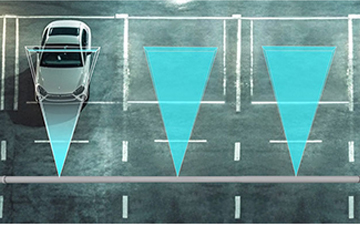VLS Series
Long Distance Series Product Model

2025-03-07
Our innovative products, particularly our parking space sensors, harness the advanced capabilities of LiDAR (Light Detection and Ranging) technology to revolutionize the way parking spaces are identified, monitored, and utilized. By employing LiDAR, we can provide highly accurate and real-time data that enhances the efficiency and effectiveness of parking solutions.

Understanding Reflectivity in Parking Space Sensors
Reflectivity plays a crucial role in the performance of parking space sensors. It refers to how well a sensor can detect objects based on the light that bounces back from them. At Benewake, our parking space sensors utilize advanced LiDAR technology that effectively measures reflectivity to ensure accurate readings. When selecting a LiDAR sensor for parking, it is essential to consider the types of surfaces it will be monitoring. Different materials have varying reflectivity levels, which can influence detection accuracy. For instance, asphalt and concrete reflect less light compared to metallic surfaces. Therefore, it is vital to choose a sensor capable of handling a diverse range of reflectivity to ensure reliable performance in all conditions.
Assessing Detection Range for Optimal Performance
The detection range of parking space sensors is another critical factor to consider. This refers to the maximum distance from which the LiDAR sensor can accurately detect the presence or absence of a vehicle in a parking space. At Benewake, we offer parking space sensors with extended detection ranges, enabling effective monitoring over larger areas. When choosing a LiDAR sensor, it is important to evaluate the specific needs of your parking environment. For example, multi-story parking facilities may require sensors with longer detection ranges to ensure comprehensive coverage. Additionally, sensors with a wider field of view can enhance overall efficiency by capturing more data simultaneously, reducing blind spots in parking management systems.
The Importance of Weather Resistance
An often-overlooked aspect of parking space sensors is their ability to withstand various weather conditions. Outdoor parking areas are frequently exposed to rain, snow, and extreme temperatures. At Benewake, our parking space sensors are designed with weather-resistant features, ensuring consistent performance regardless of external conditions. When selecting a LiDAR sensor for parking applications, consider the environmental challenges it will face. Choosing a robust sensor designed for durability can significantly impact the effectiveness of parking space monitoring systems, leading to fewer maintenance issues and improved reliability.
Conclusion
We invite you to explore our innovative lineup of LiDAR sensors and discover how they can revolutionize your parking management strategies. Our dedicated team at Benewake stands ready to assist you in identifying the most suitable solutions for your operations, ensuring that you achieve maximum efficiency and driver satisfaction. Together, we can pave the way for smarter parking solutions that enhance urban mobility and create a more organized and accessible environment for all.